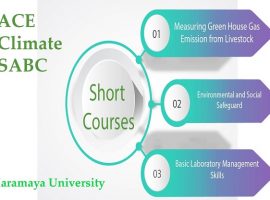

The Africa Center of Excellence for Climate Smart Agriculture and Biodiversity Conservation is set to embark on top quality short term courses for faculty, students and stakeholders to ensure self-sustainability of the center in the long run.
The center will extensively work on high-standard trainings and short courses with the use of highly qualified resource persons at a national and international level.
To boost research capacity of post-graduate students (PGSs) and the internal capacity of the faculty, trainings on Quantitative Data Management for PGS is slated to be conducted soon.
Trainings on Measuring of Green House Gas Emission from Livestock for PGSs, Assertiveness Training for female faculty and PGSs, Training on Environmental and Social Safeguard, for laboratory and waste management workers, Basic Laboratory Management Skills for field and laboratory assistants will be convened.
Moreover, effective scientific writing and communication courses will be provided to students and faculty members for the success of the project targets.
Skill oriented trainings, will be conducted in partnership with national and regional stakeholders operating in the area of climate smart agriculture, biodiversity conservation focusing on helpful technologies, practices and policies for climate adaptation and mitigation.
These efforts are meant to beef up the capacity of the center towards successfully mobilizing partners and funding agencies to enable students come up with cutting edge researches supported by state of the art technologies.
Accordingly, the center will intensify its ties with regional and international partners for high quality outputs in research and technological innovations.
The Center so far completed the preparation of course contents for most of the short term trainings.
Amongst the course contents prepared are Assertive-ness training for female students and faculty, innovative teaching methodology for faculty, effective post-graduate research supervision, training on basic laboratory skills, and training on inclusiveness and diversity.
The courses were prepared by 14 faculty members and a library head in five different teams, each containing three members.
Content preparation for more courses is expected to continue as the Center plans a number of trainings for students, staff and stakeholders.
The center aims to give a number of short courses and trainings on various subjects and these short course content preparations are part of that effort.
